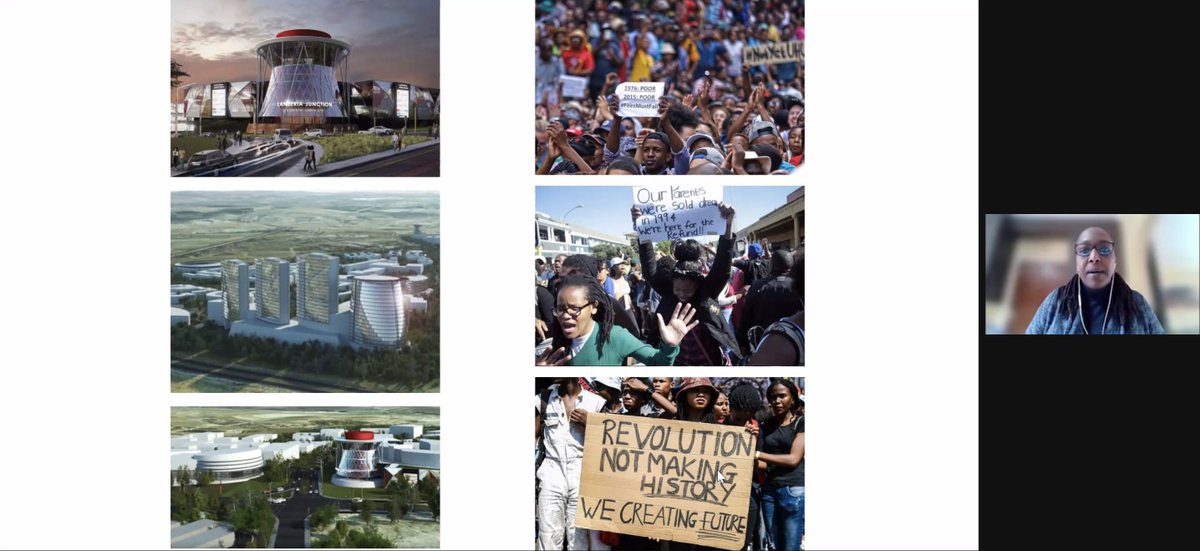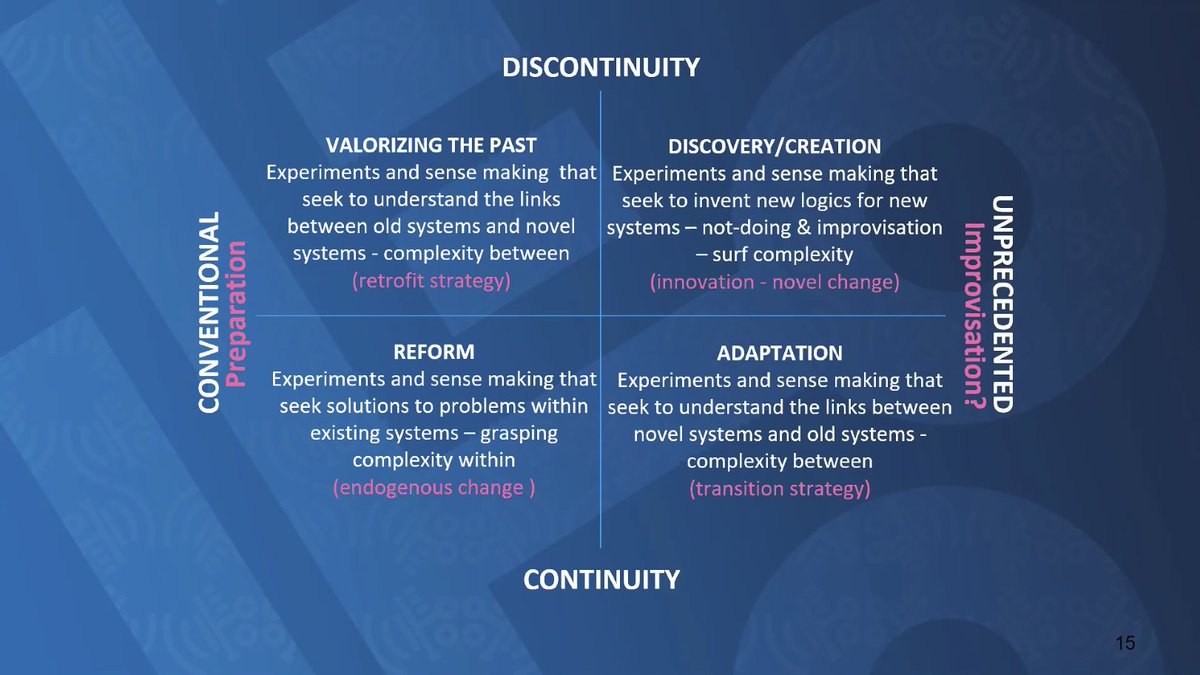LIVE | We are live tweeting from the #GPUP seminar on & #39;Geopolitics & Urbanisation in Africa& #39;. You can still join the session here: https://us02web.zoom.us/meeting/register/tZMsduisrT0sH9Z4Wlgt-YRWEFu4yISWMyOD%20">https://us02web.zoom.us/meeting/r...
As part of the Great Powers and Urbanisation Project, this seminar, by focusing on cities across Africa, explores how different urbanisation challenges & opportunities take on particular inflections due to the relationships between local, regional & international scales in Africa
We kick off the session with opening remarks by Ian Klaus on the #GPUP series -- a collaboration between 6 think tanks across the globe: "The return of #geopolitics often ignore the dynamics of urbanisation"
SESSION 1 explores & #39;Possibilities for Regional Innovation and the Future of Cities& #39;. First up is @geci, who gives an input on & #39;Decolonizing #AfricanUrban Futures: Reframing imaginations and tensions across local and global institutions& #39;
On imaging #futureafrica @GEci asks how we think about new things? "To decolonize the future, we should ask the question of who& #39;s lens is used & applied in imaging the future of cities & what oppressive lenses do we need to discard."
On institutionalising change, @Geci questions the trend to prioritise transparency & accountability, & a preoccupation with check boxes & optics, rather than effectiveness on the ground and opening up spaces for innovative exploration and testing.
. @Geci shares a frame about how we might think of the future and says in the case of the future of Africa cities we might be in the more innovative phase of discovery that calls for co-creation rather than ready-made solutions.
Next up in SESSION 1, @EdgarPieterse explores & #39;The Possibilities and Imperatives for Regional Urban Innovation Platforms& #39; focusing on city regions as primary platforms for research and experimentation.
. @EdgarPieterse points out 2 key dynamics on the African continent is that of labour markets which is predominantly informal combined with the youthful demographic profile of the continent with 60% younger than 24 years old increasing centred in cities.
According to @EdgarPieterse increasingly the pressures precipitated by the dominant informal urbanism see on the continent will be political in nature rather than just socio-economic.
In closing @EdgarPieterse remarks if Africa is intent on an endogenous model of growth, cognisant of the green imperative that addresses poverty & inequality, then the substance of how is vague & not spatialised. He believes city regions should lead & can bring substance to this.
SESSION 2: & #39;Reflections on Urban Sectorial Challenges and Opportunities& #39; will be animated by inputs from @EconologicAnt, @Tucksby, Liza Cirolia and Warren Smit.
The session explores how effective strategies to improve #urbanhealth, articulate & enable effective #urbanfinance systems and processes, and address #climatechange in #Africa must be read in relation to multi-scalar governance and international agendas.
First up is ACC researcher Warren Smit on & #39;The World Health Organization, Healthy Cities and Africa& #39;
Smit discusses the shift in WHO approach from one of diseases prevention to a socio-ecological perspective on that recognises the significant impact the environment, & by implication cities, has on the health & well-being of residents.
This resulted in UN Healthy Cities, which defined a heathy city as “one that is continually creating & improving the physical and social environments and expanding the community resources that enable people to support each other in performing the all functions of life."
Smit discusses how the Healthy Cities programme landed in the context of the newly post-apartheid Cape Town, in 1997 & was eventually abandoned as elsewhere in Africa.
While there is still a Healthy Cities programme it is not active in Africa, where it has been replaced with Healthy Homes, Healthy Villages and Healthy Food Market, which is much less ambitious and does not operate at the city-scale.
He ascribes this failure partly to the modernist reliance on science; its technocratic approach, the lack of understanding of local governance structures and dynamics, a lack of responsiveness to bottom-up engagement.
Next up is ACC Deputy Director @Tucksby on & #39;How Cities, NGOs and Communities Need to Better Engage with PEPFAR’s Approaches to Global Public Health& #39;
. @Tucksby discusses in the implications of PEPFAR’s Approaches to Global Public Health:
- Decision about funding & cuts aren& #39;t made in collab with in-country partners or local govs. while it has a significant impact on cities health care budgets & ability to deliver serves.
- Decision about funding & cuts aren& #39;t made in collab with in-country partners or local govs. while it has a significant impact on cities health care budgets & ability to deliver serves.
- NGOs limit activities to only those that can be directly reported back to PEPFAR& #39;s framework for cross-country comparison. & aligned with reporting timelines. This doesn& #39;t serve the recipients of the aid & lead to suspicion & disengagement.
Anton Cartwright, @EconologicAnt reflects on & #39;Co-creating and Reviewing National Urban Policies with a Focus on Climate Change Abatement in the Context of International Organisational Funder Imperatives in Ghana and Tanzania& #39;
Cartwright gives an overview of the & #39;messy and complex& #39; context of the two country contexts which shared several characteristics (rapid urbanisation, flagship policies, green ambitions) but were also distinct in its approach to cities.
To engage in these contexts, the African Centre for Cities set up UrbanLabs in order to work in a co-produced, transdisciplinary way with in-country local researchers, officials and urbanists.
Find more on this work here: https://www.africancentreforcities.net/programme/coalition-urban-transitions/">https://www.africancentreforcities.net/programme...
The last input is from ACC researcher Liza Cirolia on & #39;The Geopolitical Implications of Fractured Fiscal Authority and Fragmented Urban Infrastructure Systems in African Cities& #39;
Cirolia explores two aspects: First, the fractured nature of the urban infrastructure network, and secondly the fractured nature of urban statecraft in the African context.
Read more on this in her recent paper & #39;Fractured fiscal authority and fragmented infrastructures: Financing sustainable urban development in Sub-Saharan Africa& #39; : https://www.sciencedirect.com/science/article/pii/S0197397520305026">https://www.sciencedirect.com/science/a...

 Read on Twitter
Read on Twitter




